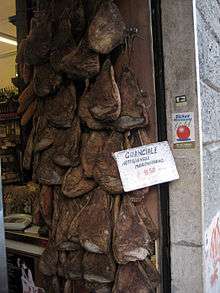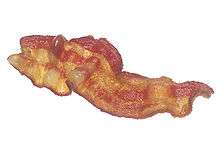Guanciale

Guanciale (Italian pronunciation: [ɡwanˈtʃaːle]) is an Italian cured meat or salami product prepared from pork jowl or cheeks. Its name is derived from guancia, Italian for cheek.[1]
Production
Pork cheek is rubbed with salt, sugar, and spices (typically ground black pepper or red pepper and thyme or fennel and sometimes garlic) and cured for three weeks or until it loses approximately 30% of its original weight. Its flavor is stronger than other pork products, such as pancetta, and its texture is more delicate. Upon cooking, the fat typically melts away giving great depth of flavor to the dishes and sauces it is used in.
In cuisine
Guanciale may be cut and eaten directly in small portions, but is often used as a pasta ingredient.[2] It is used in dishes like spaghetti alla carbonara and sauces like sugo all'amatriciana.
It is a specialty of central Italy, particularly Umbria and Lazio. Pancetta, a cured Italian bacon which is normally not smoked, is sometimes used as a substitute when guanciale is not available.[3]
See also
References
- ↑ "Italy's ultimate answer to bacon: Guanciale". Salon. November 10, 2010. Retrieved 11 November 2013.
- ↑ Michael Ruhlman; Brian Polcyn (27 August 2012), Salumi: The Craft of Italian Dry Curing, W. W. Norton & Company, pp. 87–89, ISBN 978-0-393-06859-7
- ↑ "The New Bacon: Pancetta, Guanciale and More", San Jose Mercury News, 2011-03-15
External links
-
 Media related to Guanciale at Wikimedia Commons
Media related to Guanciale at Wikimedia Commons -
 The dictionary definition of guanciale at Wiktionary
The dictionary definition of guanciale at Wiktionary - How to Make Guanciale
